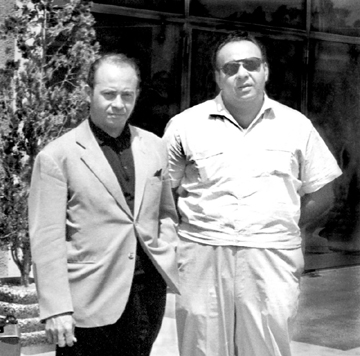|
Piaggine is a tiny Italian town in the province of Salerno. Though its inhabitants number in the hundreds, those with roots in the town include several who have gone on to become distinguished in their respective fields. Dionisio Flagello was born in Piaggine in 1898 and immigrated to the United States with his wife Genoveffa in 1923. An amateur musician himself, he fathered two sons—Nicolas and Ezio—both of whom developed international reputations in their respective musical specialties. Nicolas (1928-1994) pursued a career as a composer and conductor; Ezio (1931-2009) was an operatic bass-baritone. Piaggine’s current mayor, Angelo Ciniello, with the cooperation of the town legislators, conceived of a project to honor those noteworthy individuals whose origins can be traced to the town; they were able to access funding for the project from the Italian government. One component of the plan was to convert an old palazzo into a museum, which would serve as a multimedia archive for memorabilia related to the town’s “Hall of Fame.”
Another native of Piaggine is the flautist and conductor Franco Vigorito. Some years ago he had learned that Ezio Flagello had roots in his home town. More recently he learned of Nicolas, discovering his music on the Internet. Enamored with Nicolas’ music, Vigorito contacted Dianne Flagello, the composer’s widow, now living in New York, and requested scores and other information. He felt that the Flagello brothers were ideally suited for inclusion in the town’s “Hall of Fame,” along with four other notables. Vigorito set about learning as much as he could about the two musical brothers. To assist him in this effort he contacted relatives of the Flagellos, who supplied him with scores, recordings, videos, photographs, articles, critiques, and even costumes worn by Ezio during his days performing with the Metropolitan Opera, La Scala, and other leading opera companies. Vigorito planned to include this memorabilia for display in the new museum. As he familiarized himself with this material, the scope of Vigorito’s vision expanded, and he began to perform and record a number of Nicolas’ works, and published several scores to make them available in Italy.
The town’s efforts culminated on August 20, 2011, in a festival to mark the opening of the new museum, including a concert and ceremony, attended by dignitaries from various locations throughout Italy. One highlight was the naming of a street after the Flagellos. Available at the event were three compact discs produced by Vigorito: one featuring new performances of a number of works by Nicolas; another comprising musical selections sung by Ezio, accompanied by an orchestra conducted by Nicolas; and a third featuring well-known arias sung by Ezio, taken from his many opera recordings. In addition, the chapter on Nicolas’ life and works, taken from American musicologist Walter Simmons’ book, Voices in the Wilderness: Six American Neo-Romantic Composers, was translated into Italian by Emiliano Giannetti and reprinted as a small volume on its own.
More than 500 people attended the concert, which featured Rome Opera soprano Rita Cammarano in a large selection of Nicolas’ songs. Vigorito conducted the Rossini Chamber Orchestra in several of Nicolas’ works for strings, and served as flute soloist in the performance of a movement from Nicolas’ Flute Concerto. Saverio SanGiacomo sang a group of arias that had been Ezio’s specialties. Also performing were harpist Lucia DiSapio and guitarist Constabile Caruccio. The members of the audience, comprising people of all ages and walks of life, responded enthusiastically with a standing ovation.
Not only was Nicolas’ music honored, but also his contribution to the culture of Amalfi, where he had created and managed an annual summer music festival that continues to this day. In addition to his contributions to the world of opera, Ezio’s cameo appearance in the film Godfather II was noted, as well as the Grammy Award he had won for dramatic excellence.
|
